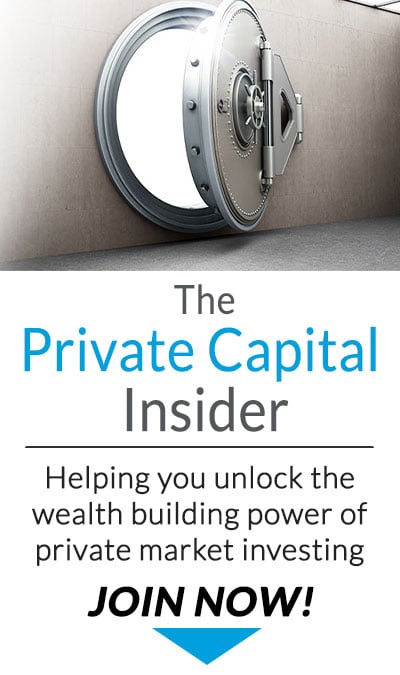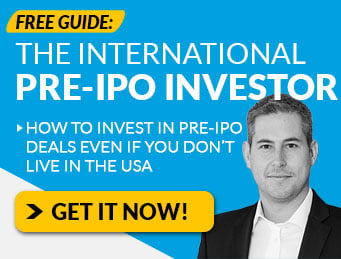Everyone likely knows they’re supposed to “do their own research” before making an investment.
But here’s the cold hard truth about due diligence, which we all have to deal with…
For the vast majority of retail investors interested in private investments, they may have neither the time, opportunities, resources, or skills necessary to perform proper due diligence.
Here’s the good news: The secret to successful investing is to simply avoid the obvious losers.
Here’s the bad news: Most people have no idea what to look for to spot the obvious losers.
In today’s Private Capital Insider, we’ll discuss how the average retail investor can perform basic due diligence to spot potential “Red Flags” that make it easier to say no, faster.
-Jake Hoffberg
P.S Looking for back issues of Private Capital Insider?
Evolution of Investment Due Diligence: How to Navigate New Terrain
Years ago, emerging companies were primarily funded with the help of small investment banking firms. Those underwriting departments were, and continue to be staffed by well-experienced, fully licensed personnel.
However, since the JOBS Act of 2012, and the crowdfunding boom in the U.S., many people without traditional investment banking or corporate finance background have entered the fray.
Some crowdfunding portals have gone so far as to advertise their embarrassingly short due diligence processes, and in some cases, companies can have their capital raising campaign live on certain platforms in less than 24 hours.
While this short timeframe might be under the assumption the company has all of its documentation ready to go…
How is it possible the platform performed adequate, or any, due diligence in a single day?
How are you – the average investor – expected to perform sufficient due diligence within the extraordinarily limited timeframe and information provided?
And perhaps more to the point, even if they did provide sufficient information, would you really understand what you’re looking at?
Short answer: because you likely cannot perform adequate due diligence in the situations described, you are often forced to rely on the representations provided by the Company.
And almost by definition, being forced to rely solely on information provided by the selling party, the transaction is suspect and should be considered “high risk.”
That’s why it’s not a stretch to say that many retail investors rely on third-party due diligence – by a licensed financial professional, an investment platform, or a publisher – when considering an investment opportunity.
While I think we can all agree that anyone investing in alternative investments understands these are often high-risk opportunities, and they’re okay with the realities that most of these plays will not generate positive returns…
The #1 thing we hope we NEVER have to worry about is losing our investment due to outright fraud – something we’re seeing more of on various alternative investment platforms.
To be fair, investors may make mistakes, and criminals may certainly be clever people. But more often than not, fraudulent activity relies on the assumption that investors may be too lazy or time constrained to read the paperwork and do some basic fact checking.
A recent academic paper demonstrates the value of public disclosure in a compelling way. This paper found that newly public companies with the highest levels of institutional investment significantly outperformed those with the lowest levels.
According to the study, institutional investors were not appreciably better than individual investors at picking big winners, but they were much better at avoiding the worst-performing investments.
The interesting thing is how they did it: The authors found little evidence that institutions were able to exploit private information to improve investment returns. Nor did the evidence of that particular study suggest that institutions were able to improve the performance of companies they invest in through active monitoring.
Instead, it seems that these institutional investors succeeded by making better use of the available public information — focusing on fundamentals like operating history, prior earnings, size, and liquidity.
If we believe this to be true, then as retail investors, our goals shouldn’t be to figure out which private investments could become winners, but instead, to focus on ones that are obvious losers – or otherwise they fail to provide a chance for better risk-adjusted returns than opportunities in public markets.
Basic Due Diligence: Say “NO!” Faster By Looking For These Common Red Flags
As a general consideration, the majority of all investors share a similar problem – deal flow.
More specifically, access to deals that fit our investment criteria.
When investing in public markets, because of the sheer amount of available information, finding stocks that fit your thesis is rather straightforward.
In fact, there are plenty of software solutions that may help you identify these stocks, by simply entering in the variables you’re looking for.
However, in private markets, it’s more of a “kiss a lot of frogs” type thing, especially if you’re investing in early-stage deals.
That’s why professional investors will look at 1,000+ investment opportunities per year, and maybe invest in only 10-20 of those deals.
While you’re probably not going to look at that many deals…
As you’d imagine, simply getting exposure to a large volume of data means you have some sort of reference point to “pattern match” against.
And if you’re anything like the typical retail investor, you simply aren’t writing big enough checks for this level of effort to be “worth it,” relative to far simpler strategies (like dollar cost averaging into a low cost index fund).
Realistically, this means the only thing you can perform reasonable due diligence on is the platform hosting the offering, and the promoter introducing you to the opportunity, which may be the same entity.
Of course, crowdfunding platforms make money through a combination of listing fees, transaction fees, and success fees.
The conflict arises when platforms rely too much on listing and transaction fees, rather than success fees.
Alternatively, if the platform makes claims regarding the strength of its deal flow and selection process – but doesn’t clearly articulate exactly what it is, or by what reasonable industry standard it is making this assessment – this calls into question the believability of the platform’s claims.
It’s also important to remember there is a big difference when it comes to how investment platforms underwrite debt offerings (private credit) and equity offerings (private equity).
Credit risk and analysis is the bread and butter of traditional lenders, and debt is underwritten using clear metrics regarding the borrower’s ability to repay.
However, underwriting an equity offering often requires:
- a specialty firm that understands the specific nuances of that industry,
- the competitive landscape,
- market capitalization,
- current market conditions,
- forward-looking perspectives, and
- the inherent uncertainty that comes with financing emerging companies.
Generally speaking, this is called “investment banking.”
With all this information in mind, here are some questions you might want to ask platforms and businesses before you invest:
- Regarding the quality of investment products: Has the platform ever listed an offering for a simple agreement for future equity (or SAFE)? If so, what percentage of those SAFEs either never converted into equity, or the repurchase clause was exercised? Has the platform ever listed an offering where management, or other insiders, sold personal shares as part of the offering?
- Regarding due diligence: How often does the platform perform site visits? What documentation does the platform request from the issuer? Does the platform require thorough investigation into, not only, the financial viability of an issuer, but also the structure of its corporate entity, where it stands among its peer group, and if the management team is well qualified?
- Regarding underwriting: What processes are in place to review the financial models provided by the issuers? How many offerings are listed, absent a financial model? In addition to the required reviewed or audited financials, does the platform provide current financials? If so, have there been any adverse events, identifiable on the income statement and balance sheet, since those financials were stated?
- Regarding valuation: How exactly does the platform determine — or otherwise challenge — the valuation of the issuer’s offering? Does the platform allow the issuer to make forward-looking projections that are abnormal, unusual, or otherwise out of character with comparable companies?
- Regarding marketing communications: Does the platform understand regulatory guidelines, including what is and isn’t permissible to say or predict? How does it enforce this on its platform? What is its compliance and review process? Have the claims presented by the issuer’s offering pages been thoroughly vetted for accuracy and proper citation?
- Regarding investor education: Does the platform provide educational materials to help retail investors understand how to do their research? If so, what information does the platform supply that can only be provided by the issuer, which would be necessary for an investor to do their own research? Does it provide original research on industry trends comparable by sector? Does it provide thorough information on the corporate entity, management team, and board of directors?
All of this leads to a point…
Let’s assume you’re satisfied with a potentially intermediary’s compliance process, assume there is a low risk of fraudulent activity, and you also can reasonably assume the promoter is acting in good faith.
There is still the question of whether, or not, the offering is worthy of further consideration.
Remember: if you are being solicited for an investment, it means the company is selling a regulated financial product called a “Security.”
While these legal documents associated with the offering of a security aren’t the most fun things in the world to read, they may contain a lot of useful information regarding the investment opportunity.
Here are the types of “Red Flags” you may want to look for within the offering documents.
- Lack of a Clear Business Plan (or confusing Use of Proceeds): Every offering must disclose what they are planning to use the capital for. If the use of proceeds doesn’t make sense, and it is primarily being used to pay down debt (especially debt owned by the founders), or has the majority of funds going to something non-specific or vague (like “working capital”)… this could be a major red flag of a lack of governance.
- Minimal Work Hours by Founders: How comfortable are you investing in a business where the founders generally don’t work more than 30 hours per week? What about a company that has no full-time employees, and the founder needs the capital to quit their full-time job and run the company?
- Founder (or preferred) shares with disproportionate voting rights: While small investors are unlikely to acquire enough voting rights to make a notable difference, this is more of an issue of accountability and governance, than an indication of fraud. Even if you never plan on voting, this may create problems down the road, with regard to the company’s ability to continue raising capital – especially from institutional investors.
- Proxied Votes or “Lead Investor” provisions: These terms often require you to relinquish voting rights, and receive a form of carried interest for “managing” the shareholder base.
- Interest payments not commensurate with the risk taken by debt-holders, often below market rates: We see this all the time with real estate offerings that offer retail investors demonstrably lower interest rates than would be provided to institutional investors. If an investor can find a comparable bond product in the public markets, a private offering would likely offer a better potential yield.
- Messy Cap Table: Most early-stage companies have a relatively simple capitalization table (a list of the shareholders with number of shares, dates purchased, and so on) – it’s the management team. But sometimes, they’ve raised capital from outside investors, and there might be some confusion around things like warrant provisions, options, SAFE notes, and the impact that may have on future dilution.
- Confusing Ownership Structure: Is it difficult to understand who actually owns the company or has the controlling interest? For example, is there any ownership from shell companies and dummy corps? How about foreign-domiciled corporations?
- Insider Selling: In some cases, you may notice in the offering circular a section called “selling shareholders.” Surprise, surprise – in some cases, the people selling are the founders/management team. This begs the question, if this company is such a good investment, why are the insiders selling their shares to you?
As a reminder, any issuer conducting a Regulation Crowdfunding (or Regulation A+) offering must electronically file its offering statement on Form C (or Form 1-A) through the Commission’s Electronic Data Gathering, Analysis and Retrieval (EDGAR) system, and listing the intermediary (crowdfunding portal or investment bank) facilitating the offering.
In addition, they are required to file ongoing updates with the SEC.
While many companies raise capital using Regulation Crowdfunding or Regulation A+ are first time capital raisers…
Be sure to look them up on EDGAR to review any previous filings they’ve made, as part of your due diligence process.
Final Thoughts: Knowledge Breeds Confidence
The landscape of alternative investments is evolving rapidly, making adequate due diligence more crucial than ever.
While we are, of course, in favor of expanding retail access to private markets…
There are still significant risks that most people may not understand.
That’s not to say retail investors should avoid investing in private markets.
In fact, we are clear supporters of providing more investor education, for both retail investors and the financial professionals that serve them.
Being armed with knowledge, asking the right questions, and maintaining a healthy skepticism, investors might navigate the complex alternative investment terrain more safely.
Whether dealing with emerging technologies or traditional investment vehicles, the principles of thorough due diligence remain the same: A critical, discerning approach is a key component for mitigating risk of one’s investment against the unpredictable waves of market trends and hype.





